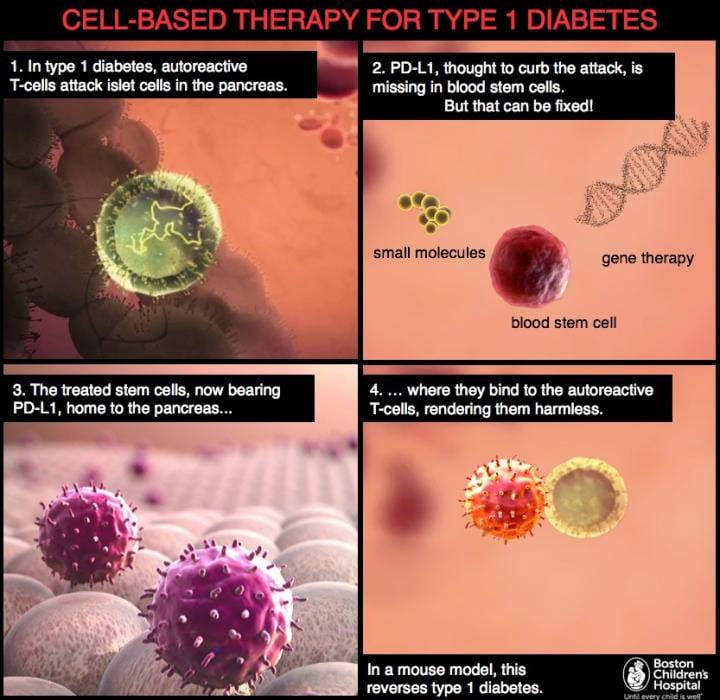
In type 1 diabetes, autoreactive T-cells attack insulin-producing islet cells in the pancreas (frame 1). Fiorina and colleagues showed that the network of genetic regulatory factors controlling production of a protein called PD-L1 is altered in blood stem cells from diabetic mice and humans. They then showed that PD-L1 production could be stimulated by treating blood stem cells with gene therapy or with small molecules (frame 2). The treated stem cells, now bearing PD-L1, home to the pancreas (frame 3), where they bind to the autoreactive T-cells, rendering them harmless (frame 4). In a mouse model, this reverses type 1 diabetes. Credit: Andrea Panigada/Nancy Fliesler
Researchers at Boston Children’s Hospital have successfully reversed type 1 diabetes in a mouse model by infusing blood stem cells pre-treated to produce more of a protein called PD-L1, which is deficient in mice (and people) with type 1 diabetes. The cells curbed the autoimmune reaction in cells from both mice and humans and reversed hyperglycemia in diabetic mice.
Findings were published today in Science Translational Medicine. “There’s really a reshaping of the immune system when you inject these cells,” says Paolo Fiorina, MD, PhD, of Boston Children’s, senior investigator on the study.
The study shows that the treated stem cells, given to mice, home to the pancreas where islet cells are made. Almost all the mice were cured of diabetes in the short term, and one third maintained normal blood sugar levels for the duration of their lives. The treatment was effective whether PD-L1 production was stimulated through gene therapy or pre-treatment with small molecules.
The powers of PD-L1
Previous studies have tried using immunotherapies for type 1 diabetes, aiming to curb the autoimmune attack on the body’s islet cells. These attempts have failed, in part because the therapies have not targeted diabetes specifically. Autologous bone-marrow transplant — infusing patients with their own blood stem cells to reboot their immune system — has helped some patients, but not all.
“Blood stem cells have immune-regulatory abilities, but it appears that in mice and humans with diabetes, these abilities are impaired,” says Fiorina, in Boston Children’s Division of Nephrology. “We found that in diabetes, blood stem cells are defective, promoting inflammation and possibly leading to the onset of disease.”
A team led by Fiorina and first author Moufida Ben Nasr, PhD, also of Boston Children’s, began by profiling the transcriptome of blood stem cells to find out what proteins the cells are making.
Using a gene expression microarray, they found that the network of genetic regulatory factors (microRNAs) controlling production of PD-L1 is altered in blood stem cells from diabetic mice and humans. This prevents production of PD-L1, even early in the disease.
They further showed that PD-L1 has a potent anti-inflammatory effect in the context of type 1 diabetes.
PD-L1 is known as an immune “checkpoint” molecule. It binds to the PD-1 receptor (inhibitory programmed death 1) on the inflammatory T-cells that are activated to cause autoimmune reactions. This causes the T-cells to die or become anergic (or inactive).
When Fiorina, Ben Nasr and colleagues introduced a healthy gene for PD-L1 into the stem cells, using a harmless virus as the carrier, the treated cells reversed diabetes in the mice. Fiorina and colleagues also found they could achieve the same effect by treating the cells with a “cocktail” of three small molecules: interferon beta, interferon gamma and polyinosinic-polycytidylic acid.
“We think resolution of PD-L1 deficiency may provide a novel therapeutic tool for the disease,” Ben Nasr says.
Publication: Moufida Ben Nasr, etal., “PD-L1 genetic overexpression or pharmacological restoration in hematopoietic stem and progenitor cells reverses autoimmune diabetes,” Science Translational Medicine, 2017: Vol. 9, Issue 416, eaam7543; DOI:10.1126/scitranslmed.aam7543

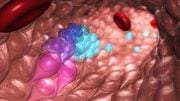
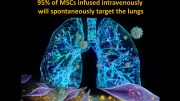
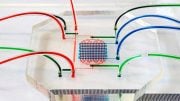
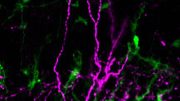
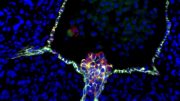
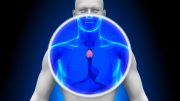

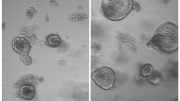
Be the first to comment on "Researchers Reverse Diabetes in a Mouse Model Using Modified Stem Cells"